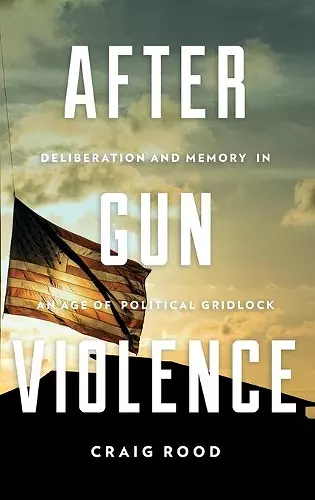After Gun Violence
Deliberation and Memory in an Age of Political Gridlock
Format:Hardback
Publisher:Pennsylvania State University Press
Published:4th Jun '19
Currently unavailable, and unfortunately no date known when it will be back
This hardback is available in another edition too:
- Paperback£20.95(9780271083841)

Mass shootingsare now part of normal American life, and public deliberation in the wake of a mass shooting follows a familiar pattern: blame is cast, political positions are taken, and no meaningful policy changes are made. Using a rhetorical lens to analyze how we talk about gun violence and gun control in political speeches, news reports, and policy statements, Criag Rood examines the reasons underlying our country’s political gridlock and draws a roadmap of how we can move beyond this tragic impasse.
Selling Points:
• Gun violence and efforts to regulate it are timely issues, especially in light of the recent momentum in anti-gun violence activism and the upcoming presidential election.
• Political gridlock is also front and center in American politics today, and the conclusions that the author draws about the gun debate are relevant to improving public deliberation more broadly.
• Provides suggestions for how people on both sides of the argument might achieve mutual understanding and productive deliberation.
• Outlines a rhetorical history of the gun debate in U.S. politics.
A rhetorical study of the American political debate on gun violence and gun policy. Examines the role of public memory in shaping this discourse and its eventual policy outcomes.
Mass shootings have become the “new normal” in American life. The same can be said for the public debate that follows a shooting: blame is cast, political postures are assumed, but no meaningful policy changes are enacted. In After Gun Violence, Craig Rood argues that this cycle is the result of a communication problem. Without advocating for specific policies, Rood examines how Americans talk about gun violence and suggests how we might discuss the issues more productively and move beyond our current, tragic impasse.
Exploring the ways advocacy groups, community leaders, politicians, and everyday citizens talk about gun violence, Rood reveals how the gun debate is about far more than just guns. He details the role of public memory in shaping the discourse, showing how memories of the victims of gun violence, the Second Amendment, and race relations influence how gun policy is discussed. In doing so, Rood argues that forgetting and misremembering this history leads interest groups and public officials to entrenched positions and political failure and drives the public further apart.
Timely and innovative, After Gun Violence advances our understanding of public discourse in an age of gridlock by illustrating how public deliberation and public memory shape and misshape one another. It is a search to understand why public discourse fails and how we can do better.
“Written with passion, insight, and eloquence, After Gun Violence is a compelling exploration of a tragically American problem—regular, mass gun violence. Aligning himself with readers as a horrified witness to these deadly recurring events, Craig Rood balances outrage with perspective, weariness with resolve, sadness with hope that Americans may achieve mutual understanding on a topic that has produced mistrust and frustration. Rood respects the complexity of people’s different beliefs about guns while articulating a clear vision of a way forward. A stunning achievement.”
—Robert Asen, author of Democracy, Deliberation, and Education
“A thoughtful and sobering analysis of America’s inability to engage in serious deliberation about gun violence. Rood traces the way that past debates have created a sense that the problem is simply intractable and demonstrates the way recent efforts to deal with gun violence were crushed under the weight of past failures. Drawing on the long history of rhetoric, Rood is able not only to analyze the present difficulties but also to suggest productive ways to move these debates forward. The stakes for such a project have never been higher. Rood’s book should be required reading for any citizen wanting to engage in a real debate about the role of guns in American society.”
—Kendall R. Phillips, co-director, The Lender Center for Social Justice
“An empowering message of this book resides in the assurance that while we exist in this world that comes with its own meanings and past, we have the power within ourselves to change what language habits we use and pass down.”
—Amanda Pasierb Journal of Public Deliberation
“There could not be a more important time for a book like After Gun Violence—which connects the timely subjects of liberty, political discourse, and progress (or lack thereof). Although it was written with the specific intention of analyzing the gun debate through a rhetorical, academic lens, the lessons in After Gun Violence can be applied outside of the ivory tower and more broadly to issues beyond gun violence.”
—Peter Rentzepis World Medical and Health Policy
“Provides an instructive model for extending rhetorical interventions into the multifaceted impacts of gun violence, including police brutality, extremist vigilantism, urban violence, suicide, and domestic violence. . . . This framework invites rhetoricians, teachers, and community members to reflect on the recursive force of memory in the constructions of individual and collective identity, and it opens the door for further deliberative interventions into the material, emotional, and rhetorical tolls of political struggle.”
—Richard Branscomb Rhetoric Review
ISBN: 9780271083834
Dimensions: 229mm x 152mm x 20mm
Weight: 145g
200 pages